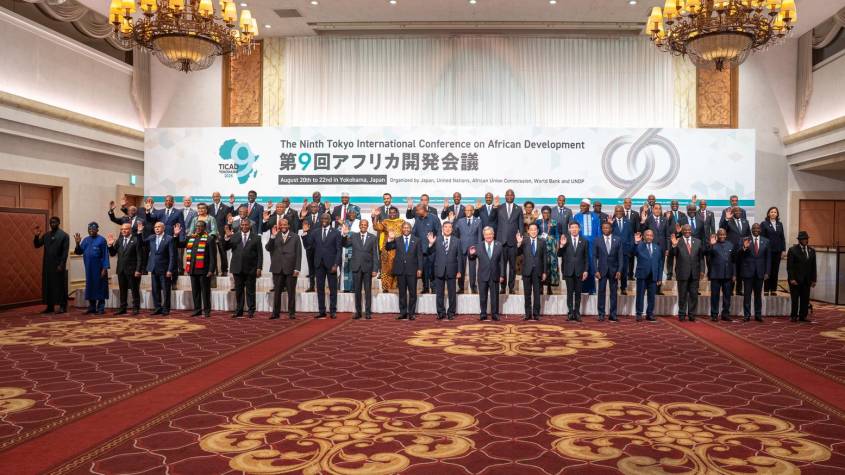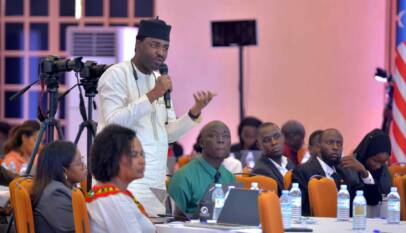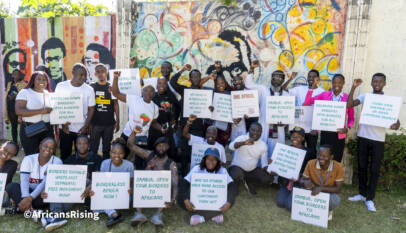OP-ED | From Tokyo to Paris: Africa’s Future Can’t be Built Abroad, By Désiré Assogbavi & Ruth Omondi
As the global order shifts, Africa risks being cast as a guest at its own table when summits are held in foreign capitals—turning partnership from equality into ritualized dependence.

When 55 African leaders pack their bags for the Tokyo International Conference on African Development (TICAD), the Forum on China-Africa Cooperation (FOCAC), or the France-Afrique Summit, the world applauds the “partnership”.
Cameras capture smiles, handshakes and declarations of “renewed cooperation”, but behind the photos and joint communiqués lies a sobering question: Why does Africa continue to gather abroad, in foreign capitals, to discuss its own future?
At TICAD 9 in Yokohama this year, a large number of African heads of state were once again in attendance. The pledges that followed echoed decades-old patterns: $5.5bn in Japanese loans, a proposed Indian Ocean-Africa economic zone, and training for 30,000 Artificial Intelligence experts over three years.
These initiatives are not unwelcome. Roads, ports and training programmes are useful. What remains missing is a clear strategy for structural transformation.
Why Always Abroad?
African leaders appear repeatedly as recipients of foreign benevolence rather than as architects of their own collective vision.
The symbolism is striking: an entire continent’s leadership leaving home to seek validation abroad. If partnership always requires Africa to appear on someone else’s lawn, then it becomes less about equality and more about ritualised dependence.
It does not have to be this way. African summits are occasionally hosted on the continent itself. Yet time and again, leaders choose to fly across continents – more than 50 planes to Japan, France, the US or Italy – just to meet one foreign leader.
Why not instead extend the African Union (AU) Summit in Addis Ababa by a few days, when every leader is already gathered, and handle external partnerships there?
Ignoring Africa’s Own Rules
The irony is that Africa already agreed on this. In 2020, the AU Assembly adopted Decision 762 (XXXIII), which stated that external partnership meetings should be attended only by a streamlined delegation: the AU Bureau, Regional Economic Communities (REC) chairpersons, African Union Development Agency (AUDA-NEPAD) leadership and the AU Commission chairperson.
This was meant to protect dignity, reduce costs and project unity. Preparations would remain inclusive, but not every head of state would be required to travel.
Yet the decision has been consistently ignored. Leaders still turn up in Tokyo, Washington and Beijing – often with greater commitment than they show to the AU Summit itself. Principle gives way to photo opportunities. The result is fragmentation and weakened credibility.
The Illusion of Progress
The hard truth is this: at these summits, too many African leaders appear more concerned with scrambling for piecemeal funding – a new hospital here, scholarships for a few hundred students there – than with advancing transformational, continent-wide projects envisioned in Agenda 2063.
Instead of negotiating for cross-border infrastructure corridors, industrial zones, energy grids or digital integration – initiatives that could truly shift Africa’s position in the global economy – leaders too often settle for petty pledges that make good headlines at home but do little to change Africa’s structural dependence.
This approach is short-sighted and costly. It fragments Africa’s bargaining power, undermines the credibility of blueprints like the African Continental Free Trade Area (AfCFTA) and leaves the continent speaking with 55 competing voices rather than one.
If African leaders redirected their energy toward major collective initiatives such as continental transport corridors, green industrial parks, regional universities of excellence, and Africa-wide energy interconnections, they would not only better align with Agenda 2063, but they would also negotiate from a position of unity and strength.
The choice is stark: continue competing for petty, fragmented projects, or rise to the challenge of building the pan-African infrastructure of sovereignty that future generations demand.
The Missing African Conference
Meanwhile, the world is shifting rapidly. Old alliances are breaking apart. New power blocs are emerging. Critical minerals, digital governance and green industrial policy are reshaping economies. Still, Africa has not convened a single continental summit to define its collective stance.
Leaders rush to Tokyo, Beijing, Paris and Washington, but not to an African-owned conference to deliberate Africa’s place in this new world order. This tragedy is not due to a lack of resources or talent. Africa has all three: youth, markets and minerals. What it lacks is unity of purpose.
Time to Regroup
The moment to regroup is now. African leaders must stop outsourcing the continent’s future and instead harness Africa’s resources collectively, from minerals to markets and agriculture. They must develop common strategies to add value locally, refining minerals, producing green energy, and building digital industries.
They must negotiate as a bloc, not as fragmented supplicants. They must also strengthen South-South cooperation with Latin America, Asia and the Caribbean to shift away from a donor-recipient model. Most importantly, they must place youth and citizens at the centre of decision-making, rather than chasing symbolic photo opportunities.
Reclaiming the AU mandate is essential. The 2020 decision to limit foreign summit attendance to rotating representatives must be enforced. Africa must also urgently hold its own geopolitical summit in Addis Ababa, or any African capital, to deliberate on its role in the shifting world order.
Leaders must shift from symbolism to substance by demanding enforceable deals abroad, not vague pledges. They must prioritise intra-African diplomacy, strengthening cooperation among governments, civil society and the private sector.
Above all, they must think generationally, not politically, making decisions that serve Africa’s future rather than short-term optics.
Until African leaders sit together on African soil to define their collective agenda, every foreign summit will serve as a reminder that the continent’s destiny is still being negotiated elsewhere.
Africa must stop outsourcing its future!
Désiré Assogbavi is Advocacy Advisor at the Open Society Foundations while Ruth Omondi is Associate Director of Communications at the Open Society Foundations. This Op-Ed article was originally published on the Africa Report; the views expressed in it are those of the authors and do not necessarily reflect African Newspage’s editorial policy.














